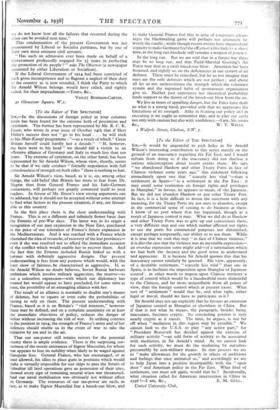[To the Editor of THE SPECTATOR]
SIR,—In the discussions of foreign policy in your columns room has been found for the extreme both of pessimism and optimism. The former has been represented by Mr. R. C. K. Ensor, who wrote in your issue of October 14th that if Herr Hitler's success does not " go to his head . . . he will stick to his Man Kampf programme : "—as a result of which " Great Britain herself could hardly last a decade." " If, however, the facts went to his head " we should fall a victim to an offensive alliance of Germany and Italy in much less than ten years. The extreme of optimism, on the other hand, has been represented by Sir Arnold Wilson, whose view, shortly, seems to be that if we only conduct " friendly negotiation with full consciousness of strength on both sides " there is nothing to fear.
Sir Arnold Wilson's view, based, as it is, on, among other things, the odd belief that Britain has more to fear from Dr. Negri!' than from General Franco and his Italo-German connexions, will perhaps not greatly commend itself to your readers. In favour of Mr. Ensor's view strong arguments can be adduced, but it should not be accepted without some attempt to find what factors in the present situation, if any, are favour- able to this country.
In the first place there is the close understanding with France. This is on a different and infinitely firmer basis than the Entente of pre-War- days. The latter was in its origin a recognition of our past expansion in the Near East, purchased at the price of our toleration of France's future expansion in the Mediterranean. And it was reached with a France which cherished the idea of revanche, of recovery of the lost provinces— even if she was resolved not to afford the immediate occasion of the conflict which would. enable her to recover them. And the fact that the Entente included Russia linked us with a partner with definitely aggressive designs. Our present understanding is free from any purpose which would, with the least show of fairness, be characterised as aggressive. If, as Sir Arnold Wilson no doubt believes, Soviet Russia harbours ambitions which involve military aggression, the reserve—to use a colourless expression—with which our diplomacy has treated her would appear to have precluded, for some time at least, the possibility of an entangling alliance with her.
The result of an alliance is normally to double one's means of defence, but to square or even cube the probabilities of having to rely on them. The present understanding with France, based as it is on Britain's " vital interests," however these may be defined, and on a complete unanimity on at least the immediate objectives of policy, reduces the danger of defeat without increasing the risk of war. In striking contrast to the position in 1914, the strength of France's army and of her defences should enable us in the event of war to take the initiative by sea and in the air.
That our sea-power still retains terrors for the potential enemy there is ample evidence. There is the surprising cor- rectness of the recent utterances of Signor Mussolini, for whom war appears to lose its nobility when likely to be waged against European foes. General Franco, who has encouraged, or at least allowed, his allies to place guns in positions which would make it virtually impossible for our ships to pass the Straits of Gibraltar till land operations gave us possession of their sites, showed every sign of remaining neutral when war threatened. And our naval mobilisation was obviously not without effect on Germany. The resources of our sea-power are such, in fact, as to make Signor Mussolini fear a knock-out blow, and to make General Franco feel that in spite of temporary advan- tages the blackmailing game will perhaps not ultimately be worth the candle; while though recent events have impaired our capacity to make Germany feel the effects of a blockade in a shor t time, in the long run blockade still remains a weapon of potency.
In the long run. But we are told that in a future war there may be no long run, and that Field-Marshal Goering's Air Force may deal us a swift knock-out blow. Attention has been focussed, and rightly so, on the deficiencies in our system of air defence. These must be remedied, but let us not imagine that ours are the only defences which are not perfect ; and above all let us not underestimate the strength which the voluntary system and the ingrained habit of spontaneous organisation give us. Neither past experience nor theoretical probability lends support to the theory of the knock-out blow from the air.
We live in times of appalling danger, but the Fates have dealt us what is a strong hand, provided only that we appreciate the limitations of its strength. Alike in framing our policy an i in executing it we ought to remember this, and to play our cards not only with caution but also with confidence.—I am, Sir, yours &c., W. T. WELLs Walpole Street, Chelsea, S.W. 3.










































 Previous page
Previous page